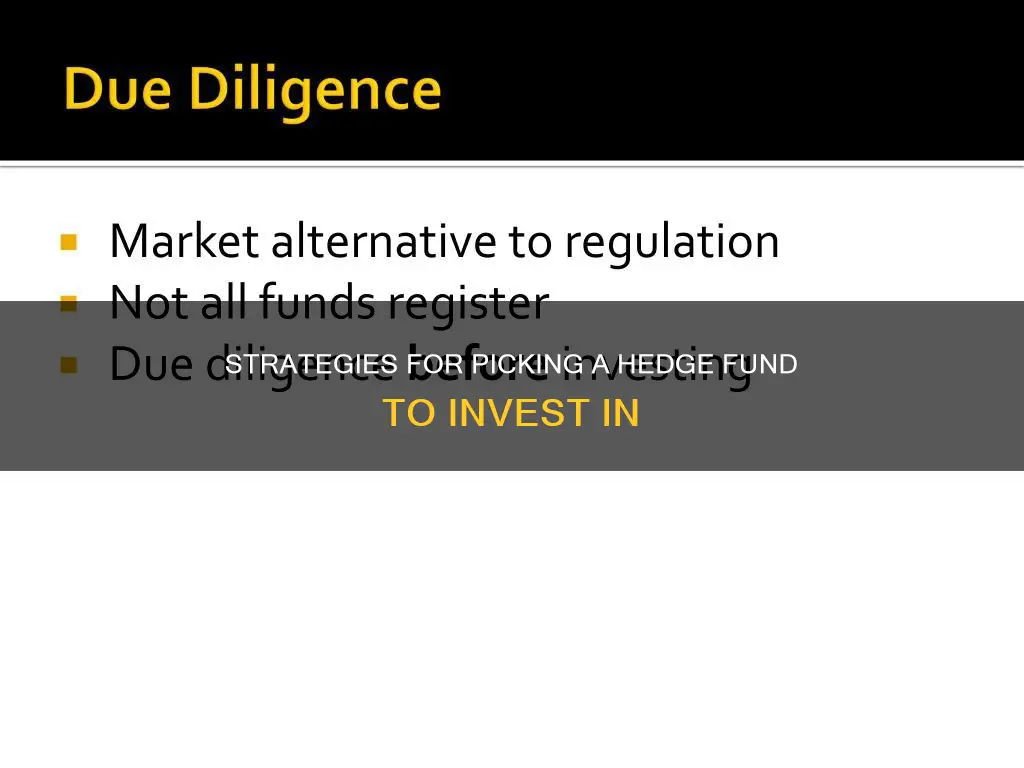
Hedge funds are a type of investment used by wealthy, accredited investors. They are actively managed funds focused on alternative investments that commonly use risky investment strategies. They are typically less regulated and riskier than more traditional investments such as mutual funds.
Hedge funds are not for everyone. They are only open to accredited investors, who are defined by federal law as someone who earned at least $200,000 (or $300,000 combined with a spouse) in each of the last two years and expects to continue to do so, or who has a net worth of $1 million or more, excluding the value of a primary residence.
If you are considering investing in a hedge fund, there are several things you should look out for. Firstly, hedge funds often charge significantly higher fees than other investments, with a standard 2 and 20 fee system, referring to a 2% management fee and a 20% performance fee. Secondly, hedge funds use risky strategies, leverage, and derivative securities such as options and futures, so you should consider whether you are comfortable with this level of risk. Thirdly, hedge funds are less regulated and more opaque than traditional investments, so you may not fully understand what you are signing up for. Finally, hedge funds often have high minimum investment requirements, typically $1 million or more, which may be out of reach for many investors.
| Characteristics | Values |
|---|---|
| Risk | Riskier than mutual funds |
| Investment strategies | Aggressive, including leveraged, debt-based investing and short-selling |
| Investment types | Real estate, art, currency, derivatives, private equity, bankrupt companies |
| Investor type | Institutional investors, such as pension funds and insurance companies; wealthy individuals |
| Minimum investment | $100,000 to upwards of $2 million |
| Liquidity | Less liquid than stocks or bonds |
| Fees | High fees, including asset management fee and performance fee |
| Historical performance | Historically underperformed stock market indices |
| Regulation | Less regulated than mutual funds |
| Investor requirements | Accredited investors with a net worth of at least $1 million or annual individual incomes over $200,000 ($300,000 for married couples) |
What You'll Learn

High fees
Hedge funds are known for charging high fees, which can eat into your overall return. The standard fee structure is "2 and 20", where investors pay a 2% management fee and a 20% performance fee. The management fee is typically calculated as a percentage of the amount you have invested, while the performance fee is calculated as a percentage of the fund's profit. For example, if you invest $1 million in a hedge fund with a 2% management fee and the fund generates a profit of $100,000, you would owe the fund manager $20,000 (2% of your investment) plus $20,000 (20% of the fund's profit), for a total of $40,000 in fees.
In recent years, fee structures have become more competitive, with some funds charging closer to 1.5% and 18%. However, these fees are still significantly higher than those of mutual funds or exchange-traded funds (ETFs), which typically have expense ratios of around 0.13% to 1.5%.
When considering investing in a hedge fund, it's important to carefully evaluate the fee structure and potential impact on your returns. High fees can offset any gains achieved by the fund, especially if the fund underperforms the market.
Additionally, hedge funds may have lock-up periods where investors are restricted from withdrawing their money for a certain amount of time, typically at least one year. This lack of liquidity can be a significant consideration when weighing the potential benefits and drawbacks of investing in hedge funds.
While hedge funds offer unique investment opportunities and strategies, their high fees and lack of liquidity may make them unsuitable for some investors. It's crucial to carefully review the fund's documents, agreements, and fee structures before making any investment decisions.
IRA Investment Options: Mutual Funds or ETFs?
You may want to see also

High minimum investment
Hedge funds are not for the faint of heart or light of wallet. Minimum initial investments for hedge funds are typically high, ranging from $100,000 to upwards of $2 million. This is because hedge funds are considered alternative investments and are targeted at wealthy, accredited investors.
Accredited investors are individuals with a net worth of over $1 million (excluding their primary residence) or an annual income of over $200,000 (or $300,000 if married). These investors are considered to have the financial sophistication to understand the unique risks associated with hedge funds and the financial cushion to absorb potential losses.
The high minimum investment requirements of hedge funds are designed to limit access to sophisticated investors who can handle large financial losses. This is because hedge funds are less regulated and riskier than traditional investments such as mutual funds. They employ aggressive, risky investment strategies and invest in speculative, illiquid assets. As a result, hedge funds are not suitable for the average investor.
If you are considering investing in a hedge fund, it is important to carefully evaluate the risks involved. Be sure to read the fund's documents and agreements, understand the level of risk and investment strategies, and research the background and reputation of the fund managers.
T. Rowe Price Funds: Cruise Investment Options Explored
You may want to see also

Risk and volatility
Hedge funds are loosely regulated by the Securities and Exchange Commission (SEC) and are therefore able to employ aggressive investment strategies that other funds cannot. They can use borrowed money to make highly concentrated bets, and they can invest in a wide range of assets, including real estate, art, currency, derivatives, and distressed securities. These alternative investments are often illiquid, meaning they cannot be easily sold for cash.
Hedge funds also tend to use leverage, which involves borrowing money to make trades. Leverage can amplify returns and losses.
Hedge funds are also less transparent than other types of funds, making it more difficult for investors to verify a fund's claims and strategies.
Due to the high level of risk involved, hedge funds are typically only available to accredited investors. These are high-net-worth individuals or organisations that are presumed to understand the unique risks associated with hedge funds.
In summary, hedge funds are a risky and volatile investment option that employs aggressive strategies to pursue high returns. They are only suitable for accredited investors who are comfortable with the level of risk involved.
Maximizing Your HSA Funds: Smart Investment Strategies
You may want to see also

Liquidity
Hedge funds often have lock-up periods, which means investors may be required to keep their money in the fund for a specified period, typically at least a year, before they are allowed to sell shares and withdraw funds. These lock-up periods can range from several months to several years, and even after this period, withdrawals may only be permitted at certain intervals such as quarterly or biannually.
Hedge funds may also impose other restrictions on redemptions. For example, they may require investors to provide advance notice of their intention to withdraw, which can impact the timing of when you can access your money. It is important to carefully review the redemption terms of a hedge fund before investing.
The limited liquidity of hedge funds can be a concern for investors who may need access to their funds in the short term. It is crucial to understand the time restrictions imposed by the fund and ensure they align with your investment goals and horizon.
Additionally, the complex and risky nature of hedge fund investments can make it challenging to find buyers for your shares if you need to withdraw your investment before the specified period. The liquidity of the underlying assets held by the fund can also impact the overall liquidity of the fund.
Compared to mutual funds, which typically offer daily liquidity, and exchange-traded funds (ETFs), which can be sold whenever the market is open, hedge funds offer more limited liquidity. Therefore, investors should carefully consider their need for liquidity before investing in hedge funds.
The Mindset of Investment Fund Managers: Traits and Insights
You may want to see also

Manager reputation and track record
When considering investing in a hedge fund, it is important to conduct thorough research on the fund manager's reputation and track record. The manager's disciplinary history, fees, and investment strategy can be found on their Form ADV, which is available on their website or through the SEC's Investment Adviser Public Disclosure database.
- Disciplinary History: Review the manager's Form ADV to identify any past disciplinary issues or conflicts of interest. This information can help assess the manager's integrity and trustworthiness.
- Investment Strategy: Understand the fund manager's investment approach and ensure it aligns with your own goals and risk tolerance. Evaluate their track record in implementing this strategy and assess the potential risks involved.
- Performance and Returns: Analyze the hedge fund's historical performance and returns over time. Look beyond short-term gains and assess their ability to generate consistent, long-term returns.
- Risk Management: Evaluate the manager's ability to manage risk effectively. Consider their experience in navigating market volatility and their strategies for mitigating losses.
- Investor Requirements: Review the investor requirements set by the fund manager, such as minimum investment amounts, lock-up periods, and redemption terms. Ensure that you meet the necessary criteria and are comfortable with the terms.
- Reputation and References: Assess the manager's reputation in the industry by seeking references from other investors or financial professionals. Due diligence in this area can provide valuable insights into their reliability and performance.
It is crucial to thoroughly research the hedge fund manager's reputation and track record before making any investment decisions. This will help ensure that your investment goals and risk tolerance align with the fund's strategies and that you are comfortable with the manager's qualifications and historical performance.
Mutual Fund Investment: Current Smart Choices
You may want to see also
Frequently asked questions
A hedge fund is an investment fund that pools money from investors to buy securities or other types of investments. They are often considered riskier than other types of investments due to their aggressive investment strategies.
Due to the high level of risk associated with hedge funds, the U.S. Securities and Exchange Commission (SEC) places regulations on who can invest in them. To invest in hedge funds as an individual, you must be an institutional investor, like a pension fund, or an accredited investor. Accredited investors have a net worth of at least $1 million or an annual income of over $200,000.
Hedge funds typically charge an asset management fee of 1-2% of the amount invested, as well as a performance fee of 20% of the fund's profit.
Hedge funds are considered riskier than other types of investments due to their aggressive investment strategies, lack of regulation, and potential for high fees. Hedge funds may also have lock-up periods where investors are unable to withdraw their money for a certain amount of time.
Common hedge fund strategies include long/short, global macro, event-driven, and arbitrage. Long/short involves buying assets expected to increase in value and selling short assets expected to decrease. Global macro focuses on broad market swings caused by economic or political events. Event-driven funds focus on specific corporate events like mergers or bankruptcies. Arbitrage takes advantage of price discrepancies between markets or securities.







